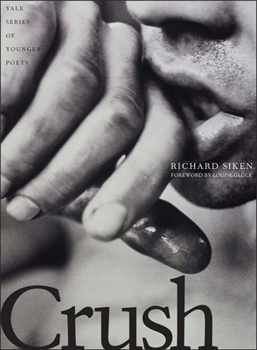Book Overview
The 2004 winner of the Yale Younger Poets competition: a powerful, confessional, erotic collection Finalist for the 2005 National Book Critics Circle Award in Poetry "Siken writes about love, desire, violence, and eroticism with a cinematic brilliance and urgency that makes this one of the best books of contemporary poetry."--Victoria Chang, Huffington Post Richard Siken's Crush, selected as the...
Related Subjects
PoetryCustomer Reviews
A beautiful read all the way through
One of one
Poems That Keep You Awake
One of the best books I've read this year.
A Beautiful Violation
A Phenomenal Collection
Crush Mentions in Our Blog

Amanda Gorman stole the show last January when she shared her poem The Hill We Climb. Her evocative, energizing voice offered a fresh, accessible take on what many consider to be an esoteric, staid genre. Her new book, Call Us What We Carry, comes out on December 7 and here we spotlight fifteen other poets whose verses provide a good entry point into the dynamic artform of poetry.






